-
 bitcoin
bitcoin $87959.907984 USD
1.34% -
 ethereum
ethereum $2920.497338 USD
3.04% -
 tether
tether $0.999775 USD
0.00% -
 xrp
xrp $2.237324 USD
8.12% -
 bnb
bnb $860.243768 USD
0.90% -
 solana
solana $138.089498 USD
5.43% -
 usd-coin
usd-coin $0.999807 USD
0.01% -
 tron
tron $0.272801 USD
-1.53% -
 dogecoin
dogecoin $0.150904 USD
2.96% -
 cardano
cardano $0.421635 USD
1.97% -
 hyperliquid
hyperliquid $32.152445 USD
2.23% -
 bitcoin-cash
bitcoin-cash $533.301069 USD
-1.94% -
 chainlink
chainlink $12.953417 USD
2.68% -
 unus-sed-leo
unus-sed-leo $9.535951 USD
0.73% -
 zcash
zcash $521.483386 USD
-2.87%
How much does a Litecoin mining machine cost?
Choosing the optimal Litecoin mining machine involves matching specifications like hashrate, power consumption, and efficiency to profitability goals, considering factors like electricity costs and mining difficulty.
Jan 10, 2025 at 10:42 pm
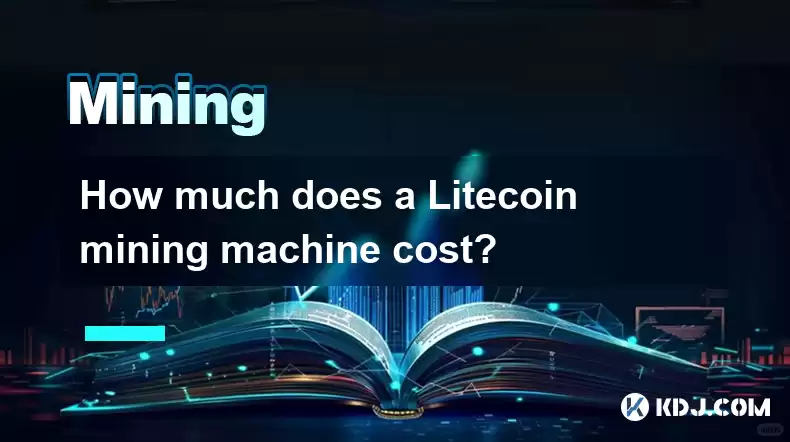
Key Points:
- Types of Litecoin Mining Machines: ASIC miners, GPU miners, and CPU miners
- Factors Affecting Cost: Hash rate, power consumption, efficiency, and manufacturing cost
- Estimated Costs: ASIC miners, GPU miners, CPU miners
- Profitability Considerations: Litecoin mining difficulty, electricity costs, mining rewards
- Choosing the Right Mining Machine: Matching hashrate, power consumption, and efficiency to profitability goals
In-Depth Analysis:
1. Types of Litecoin Mining Machines
ASIC Miners:- Specialized hardware designed exclusively for mining cryptocurrencies.
- Offer the highest hash rate and lowest power consumption, making them the most efficient option.
- Can cost anywhere from $500 to several thousand dollars, depending on hashing power.
- General-purpose graphics cards (GPUs) that can also be used for mining.
- Less efficient than ASIC miners, but more versatile and affordable.
- Typically range from $200 to $1,000, depending on the GPU model and its performance.
- Central processing units (CPUs) can also be used for mining, but are the least efficient option.
- Primarily used by hobbyists or for teaching purposes.
- May cost around $50 to $100 per CPU.
2. Factors Affecting Cost
Hash Rate: The hashrate of a mining machine measures its computing power and directly influences mining profitability. Higher hashrates lead to more mining rewards but also increase the cost of the machine.
Power Consumption: Mining machines consume significant amounts of electricity. High power consumption can increase operating costs, making it crucial to consider energy efficiency.
Efficiency: Efficiency quantifies the amount of hash power produced per unit of electricity consumed. Miners with higher efficiency consume less power for the same hashrate, leading to lower operating costs.
Manufacturing Cost: The cost of manufacturing a mining machine involves the raw materials, labor, and overhead expenses. This factor can vary based on the manufacturer and the specific machine model.
3. Estimated Costs
ASIC Miners:- Entry-level ASIC miners with hashrates around 1 TH/s can start from around $500.
- Mid-range ASIC miners with hashrates between 5-10 TH/s cost approximately $1,000 to $2,000.
- High-end ASIC miners with hashrates exceeding 10 TH/s can reach prices of several thousand dollars.
- Budget-friendly GPU miners with hashrates around 30 MH/s cost approximately $200 to $300.
- Mid-range GPU miners with hashrates between 50-100 MH/s can range from $400 to $800.
- High-end GPU miners with hashrates exceeding 100 MH/s may cost over $1,000.
- Simple CPU miners with hashrates below 1 MH/s can cost around $50 to $100.
- More powerful CPU miners with hashrates in the range of 1-5 MH/s may require additional cooling and other components, increasing their cost.
4. Profitability Considerations
Litecoin Mining Difficulty: The Litecoin mining difficulty determines the level of competition among miners. As more miners join the network, the difficulty increases, making it harder to find valid blocks and reducing profitability.
Electricity Costs: The cost of electricity is a significant operating expense for mining machines. Low-cost electricity can improve profitability, while high electricity costs can reduce potential returns.
Mining Rewards: The mining rewards issued for successfully finding and validating a block incentivize miners. These rewards are influenced by the block time, block size, and transaction fees, and can fluctuate based on market conditions and network activity.
5. Choosing the Right Mining Machine
Matching the hashrate, power consumption, and efficiency of a mining machine to profitability goals is key. Miners should consider the following factors:
- Determine their target profitability and break-even point.
- Calculate the estimated operating costs, including electricity and maintenance.
- Research and compare different mining machines based on their specifications and performance reviews.
- Factor in the expected Litecoin mining difficulty and potential changes in the mining ecosystem.
FAQs:
Q: Is Litecoin mining still profitable?A: Profitability depends on multiple factors, including electricity costs, mining difficulty, and mining rewards. Miners should carefully evaluate these factors and their potential impact on profitability.
Q: What is the best Litecoin mining machine?A: The best machine depends on individual needs and profitability goals. ASIC miners offer the highest hash rates and efficiency, but also require higher investment. GPU miners are less efficient but more versatile and cost-effective for smaller-scale mining.
Q: How long does it take to mine one Litecoin?A: The time to mine one Litecoin block varies depending on the hashrate of the mining machine and the current mining difficulty. With a high-quality ASIC miner, it may take around 24-48 hours to find a valid block.
Q: Is Litecoin mining legal?A: Mining Litecoin is generally legal in most countries. However, individuals should check their local laws and regulations regarding cryptocurrency mining before engaging in any such activities.
Disclaimer:info@kdj.com
The information provided is not trading advice. kdj.com does not assume any responsibility for any investments made based on the information provided in this article. Cryptocurrencies are highly volatile and it is highly recommended that you invest with caution after thorough research!
If you believe that the content used on this website infringes your copyright, please contact us immediately (info@kdj.com) and we will delete it promptly.
- Wall Street Whales, DeFi Dynamos, and the Cross-Asset Surge: Decoding BTC, ETH, and Hyperliquid's Latest Plays
- 2026-02-01 13:00:02
- The Big Apple's Crypto Crunch: Dogecoin, Rugpulls, and the Elusive Opportunity
- 2026-02-01 12:55:01
- Bitcoin Tumbles: Trump's Fed Pick and Geopolitical Jitters Spark Price Drop
- 2026-02-01 12:45:01
- Bitcoin's Rocky Road: Inflation Surges, Rate Cut Hopes Fade, and the Digital Gold Debate Heats Up
- 2026-02-01 09:40:02
- Ethereum Navigates Bull Trap Fears and Breakout Hopes Amidst Volatile Market
- 2026-02-01 12:55:01
- Bitcoin Shows Cheaper Data Signals, Analysts Eyeing Gold Rotation
- 2026-02-01 07:40:02
Related knowledge

How to Earn Passive Income with DePIN Mining? (New Trend 2026)
Feb 01,2026 at 12:40pm
Understanding DePIN Mining Mechanics1. DePIN mining relies on real-world infrastructure participation rather than computational hashing. Users deploy ...
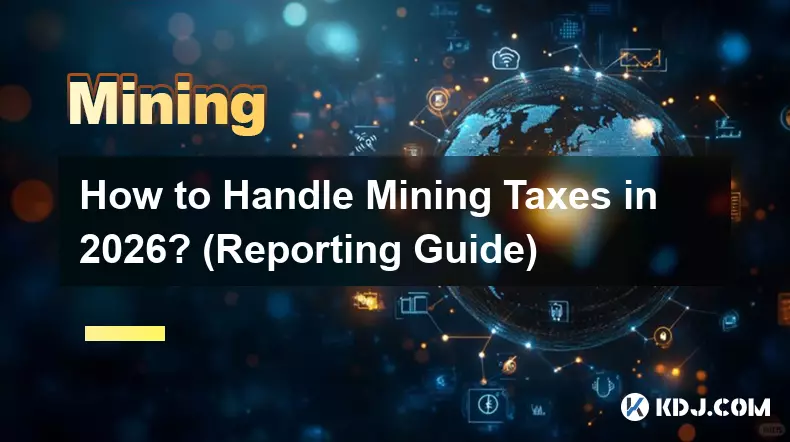
How to Handle Mining Taxes in 2026? (Reporting Guide)
Feb 01,2026 at 01:39am
Tax Classification of Mining Rewards1. Cryptocurrency mining rewards are treated as ordinary income at the fair market value on the date of receipt. 2...

How to Start Solo Mining and Win a Block Reward? (High Risk/Reward)
Feb 01,2026 at 06:40am
Understanding Solo Mining Mechanics1. Solo mining means operating a full node and attempting to solve cryptographic puzzles independently without join...
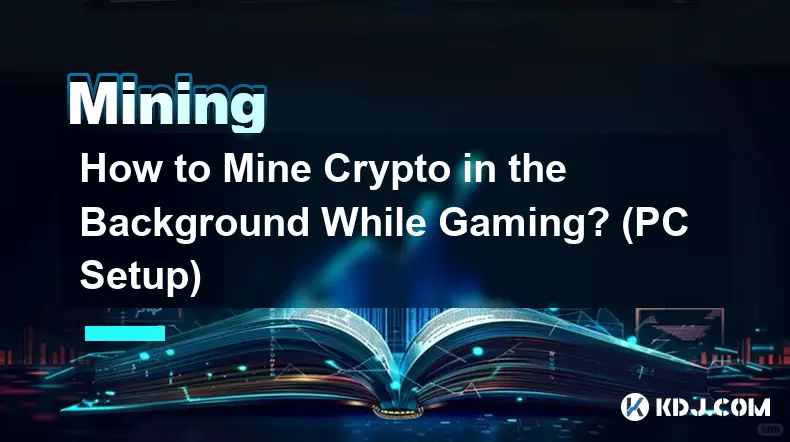
How to Mine Crypto in the Background While Gaming? (PC Setup)
Feb 01,2026 at 01:20pm
Optimizing GPU Utilization During Gaming Sessions1. Modern gaming GPUs often idle certain shader units or memory bandwidth during less demanding scene...
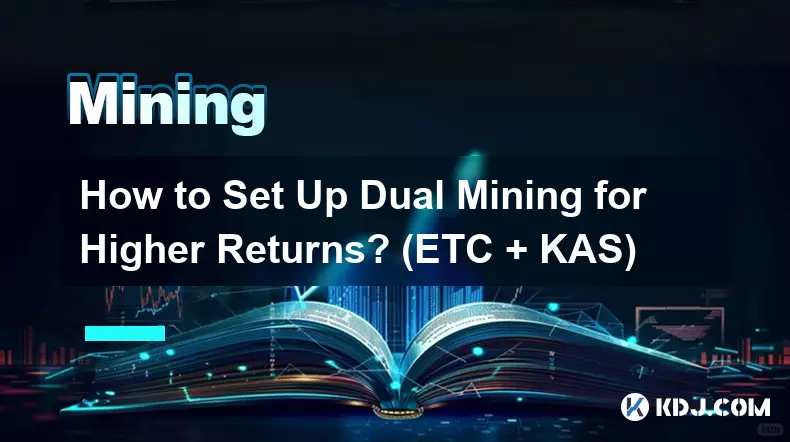
How to Set Up Dual Mining for Higher Returns? (ETC + KAS)
Feb 01,2026 at 02:19am
Dual Mining Fundamentals1. Dual mining allows a single GPU to simultaneously contribute computational power to two different blockchains using compati...
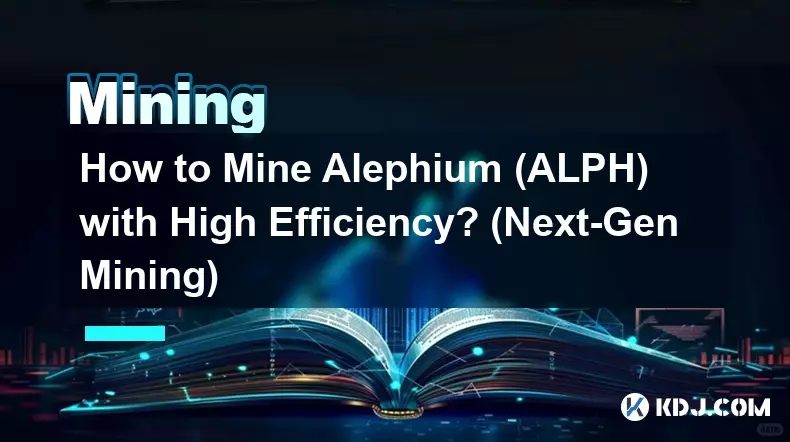
How to Mine Alephium (ALPH) with High Efficiency? (Next-Gen Mining)
Feb 01,2026 at 05:39am
Understanding Alephium's Unique Consensus Mechanism1. Alephium employs a sharded Proof-of-Work (PoW) consensus called BlockDAG with Recursive Sharding...

How to Earn Passive Income with DePIN Mining? (New Trend 2026)
Feb 01,2026 at 12:40pm
Understanding DePIN Mining Mechanics1. DePIN mining relies on real-world infrastructure participation rather than computational hashing. Users deploy ...

How to Handle Mining Taxes in 2026? (Reporting Guide)
Feb 01,2026 at 01:39am
Tax Classification of Mining Rewards1. Cryptocurrency mining rewards are treated as ordinary income at the fair market value on the date of receipt. 2...

How to Start Solo Mining and Win a Block Reward? (High Risk/Reward)
Feb 01,2026 at 06:40am
Understanding Solo Mining Mechanics1. Solo mining means operating a full node and attempting to solve cryptographic puzzles independently without join...

How to Mine Crypto in the Background While Gaming? (PC Setup)
Feb 01,2026 at 01:20pm
Optimizing GPU Utilization During Gaming Sessions1. Modern gaming GPUs often idle certain shader units or memory bandwidth during less demanding scene...

How to Set Up Dual Mining for Higher Returns? (ETC + KAS)
Feb 01,2026 at 02:19am
Dual Mining Fundamentals1. Dual mining allows a single GPU to simultaneously contribute computational power to two different blockchains using compati...

How to Mine Alephium (ALPH) with High Efficiency? (Next-Gen Mining)
Feb 01,2026 at 05:39am
Understanding Alephium's Unique Consensus Mechanism1. Alephium employs a sharded Proof-of-Work (PoW) consensus called BlockDAG with Recursive Sharding...
See all articles
























![[Audio stories] Streamer Became a Billionaire Overnight After Buying One Junk Coin [Audio stories] Streamer Became a Billionaire Overnight After Buying One Junk Coin](/uploads/2026/02/01/cryptocurrencies-news/videos/origin_697eaa9a495ed_image_500_375.webp)

















































